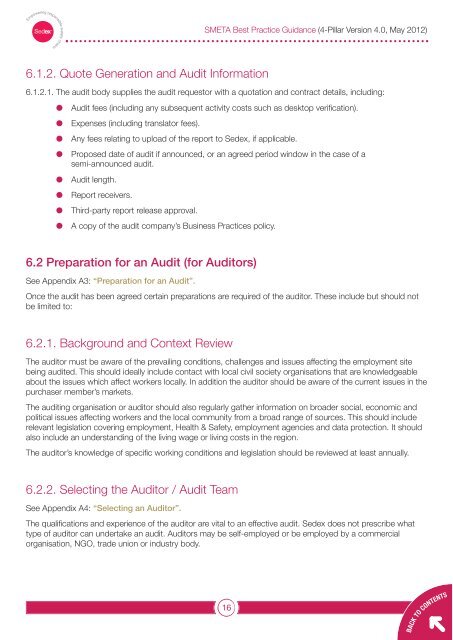Sedex Members Ethical Trade Audit (SMETA) Best Practice Guidance
Sedex Members Ethical Trade Audit (SMETA) Best Practice Guidance
Sedex Members Ethical Trade Audit (SMETA) Best Practice Guidance
You also want an ePaper? Increase the reach of your titles
YUMPU automatically turns print PDFs into web optimized ePapers that Google loves.
6.1.2. Quote Generation and <strong>Audit</strong> Information<br />
6.1.2.1. The audit body supplies the audit requestor with a quotation and contract details, including:<br />
l <strong>Audit</strong> fees (including any subsequent activity costs such as desktop verification).<br />
l Expenses (including translator fees).<br />
l Any fees relating to upload of the report to <strong>Sedex</strong>, if applicable.<br />
l Proposed date of audit if announced, or an agreed period window in the case of a<br />
semi-announced audit.<br />
l <strong>Audit</strong> length.<br />
l Report receivers.<br />
l Third-party report release approval.<br />
l A copy of the audit company’s Business <strong>Practice</strong>s policy.<br />
6.2 Preparation for an <strong>Audit</strong> (for <strong>Audit</strong>ors)<br />
See Appendix A3: “Preparation for an <strong>Audit</strong>”.<br />
Once the audit has been agreed certain preparations are required of the auditor. These include but should not<br />
be limited to:<br />
6.2.1. Background and Context Review<br />
The auditor must be aware of the prevailing conditions, challenges and issues affecting the employment site<br />
being audited. This should ideally include contact with local civil society organisations that are knowledgeable<br />
about the issues which affect workers locally. In addition the auditor should be aware of the current issues in the<br />
purchaser member’s markets.<br />
The auditing organisation or auditor should also regularly gather information on broader social, economic and<br />
political issues affecting workers and the local community from a broad range of sources. This should include<br />
relevant legislation covering employment, Health & Safety, employment agencies and data protection. It should<br />
also include an understanding of the living wage or living costs in the region.<br />
The auditor’s knowledge of specific working conditions and legislation should be reviewed at least annually.<br />
6.2.2. Selecting the <strong>Audit</strong>or / <strong>Audit</strong> Team<br />
See Appendix A4: “Selecting an <strong>Audit</strong>or”.<br />
<strong>SMETA</strong> <strong>Best</strong> <strong>Practice</strong> <strong>Guidance</strong> (4-Pillar Version 4.0, May 2012)<br />
The qualifications and experience of the auditor are vital to an effective audit. <strong>Sedex</strong> does not prescribe what<br />
type of auditor can undertake an audit. <strong>Audit</strong>ors may be self-employed or be employed by a commercial<br />
organisation, NGO, trade union or industry body.<br />
16<br />
BACK TO CONTENTS


